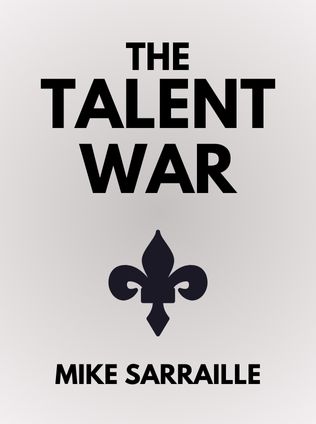
The Talent War
How Special Operations and Great Organizations Win on Talent
By Mike Sarraille
Published 10/2020
About the Author
Mike Sarraille and George Randle are the authors of The Talent War: How Special Operations and Great Organizations Win on Talent. Mike Sarraille is a former Recon Marine and retired US Navy SEAL officer with two decades of experience in Special Operations, including time with the elite Joint Special Operations Command. He is the CEO of EF Overwatch and a leadership consultant with Echelon Front, bringing a wealth of experience in leadership and talent development.
George Randle, on the other hand, has a rich background in talent acquisition, with over twenty years of experience at Fortune 100 and Fortune 1000 firms. He is a Strategic Advisor to EF Overwatch and the Vice President of Global Talent Acquisition at Forcepoint. Randle's expertise lies in understanding the intricate dynamics of organizational needs and the critical role that talent plays in achieving business objectives. Together, Sarraille and Randle blend military precision with corporate acumen to provide a comprehensive guide on talent acquisition and management, making them well-qualified to author this insightful book.
Main Idea
The central thesis of The Talent War is that the most successful organizations, whether in the military or corporate world, excel because they can attract, develop, and retain top talent. The authors argue that talent is the most critical asset for any organization, and traditional hiring practices often fail to identify and nurture high-potential individuals. They advocate for a "talent mindset," a strategic approach that focuses on recognizing and developing the inherent qualities of individuals who can become top performers. This mindset involves not only identifying the right people but also investing in their continuous development and aligning their growth with the organization's strategic goals.
Table of Contents
- Introduction: The Importance of Talent
- A Talent Mindset
- What’s So Wrong with Traditional Hiring Practices?
- What Makes Special Operations So Special?
- Hire for Character, Train for Skill
- The Nine Foundational Character Attributes of Talent
- Know Thyself: Creating a Talent Acquisition Plan
- Know Your Audience: Attracting Top Talent
- Build Your Hiring Team: A-Players to Select A-Players
- The Hiring Process: A Decisive Battlefield
- Conclusion: Talent + Leadership = Victory
Introduction: The Importance of Talent
The introduction of The Talent War sets the stage for the book's exploration of the vital role that talent plays in organizational success. The authors argue that people are the most crucial element in any organization, responsible for driving innovation, delivering quality services, and solving complex problems. They emphasize that leaders must prioritize talent acquisition and development if they want to build a great organization. This section establishes the foundational belief that the 'who' is more important than the 'what'—it is the people within an organization who ultimately determine its success or failure.
"It's not what you sell that determines if your organization will be great; it's who you have doing it." - Mike Sarraille and George Randle
This quote encapsulates the essence of the book's message, highlighting that the true measure of an organization's potential lies in the quality of its people. The authors challenge leaders to shift their focus from purely financial metrics to investing in their most valuable resource: their employees.
A Talent Mindset
Adopting a talent mindset involves recognizing and nurturing high-potential individuals. This mindset is about understanding that talent is not merely about skills or qualifications but also about character and potential. The authors argue that organizations should prioritize finding individuals who exhibit traits such as resilience, adaptability, and a strong drive for achievement. These traits are more predictive of success than specific technical skills, which can often be taught. The talent mindset also encompasses a commitment to continuous learning and development, ensuring that employees are always growing and evolving to meet the changing demands of the organization.
For example, in a dynamic industry such as technology, where rapid advancements are the norm, having employees with a talent mindset means they are constantly updating their skills and knowledge to stay ahead. This proactive approach not only benefits the individual but also ensures that the organization remains competitive and innovative.
Sign up for FREE and get access to 1,400+ books summaries.
You May Also Like
The Subtle Art of Not Giving a F*ck
A Counterintuitive Approach to Living a Good Life
By Mark MansonRich Dad Poor Dad
What the Rich Teach Their Kids About Money - That the Poor and Middle Class Do Not!
By Robert T. KiyosakiHow To Win Friends and Influence People
The All-Time Classic Manual Of People Skills
By Dale CarnegieQuiet: The Power of Introverts
The Power of Introverts in a World That Can't Stop Talking
By Susan Cain



















